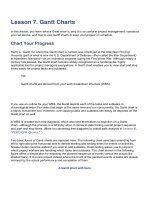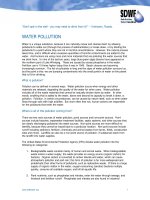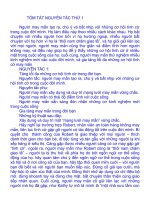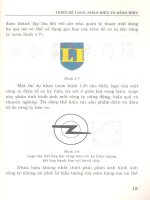DON’T LET THIS HAPPEN TO YOU 2005 phần 4 pptx
Bạn đang xem bản rút gọn của tài liệu. Xem và tải ngay bản đầy đủ của tài liệu tại đây (326 KB, 11 trang )
Chapter 9 - False Statement/Misrepresentation of Fact
Introduction
A
party to an export transaction may be subject to criminal and/or administrative sanctions for making
false statements to the U.S. Government in connection with an activity subject to the EAR. Most
frequently, the false statements are made on an export document or to a federal law enforcement officer.
Common types of false statements seen by the BIS are statements on a Shipper's Export Declaration that an
export does not require a license (i.e., that it is "NLR") when in fact a license is required for the shipment, or
statements that an export was shipped under a particular license number when in fact that license was for a
different item. False statements that are made to the U.S. Government indirectly through another person, such
as a freight forwarder, are still violations of the EAR.
Criminal / Administrative Case Examples
Azure Systems
The Violation: On July 16, 2004, Ting-Ih Hsu and Hai Lin Nee of Azure Systems, Inc., of Florida, pled guilty
to submitting a document to the U.S. Government which gave false information regarding the export of 25
low noise amplifier chips to a company in the PRC.
The Penalty: On October 6, 2004, defendants were sentenced to three years probation.
Emcore Corporation
The Violation: Between 2000 and 2003, Emcore Corporation made false statements to the U.S. Government
and violated conditions on export licenses that it had received for exports of Metal Organic Vapor Disposition
(MOCVD) tools to the PRC. Further, between 1998 and 2003, Emcore knowingly exported MOCVD tools
to Taiwan without the required export licenses, illegally serviced the tools, failed to file Shipper's Export
Declarations, and failed to retain certain export control documents.
The Penalty: Emcore agreed to pay a $400,000 administrative penalty.
Mitigating Circumstances: Emcore voluntarily self-disclosed the violations and cooperated fully in
the investigation.
DON’T LET THIS HAPPEN TO YOU!
●
EXPORT ENFORCEMENT
●
CHAPTER 9
31
Kennametal Inc.
The Violation: Between August 1998 and April 2003, Kennametal, in connection with making unlicensed
exports of nickel powder to Chile, Peru, Taiwan, and Israel made false or misleading representations on export
documentation that was filed with the U.S. Government. Kennametal also failed to comply with reporting and
record-keeping requirements.
The Penalty: Kennametal agreed to pay a $262,500 administrative penalty.
Zooma Enterprises, Inc.
The Violation: On or about December 24, 1998, Zooma Enterprises and its President, Issa Salomi, made false
statements to the U.S. Government by listing the country of ultimate destination on a Shipper's Export
Declaration as Jordan, when the destination was Iraq. Further, Salomi filed a petition with the U.S. Customs
Service after its medical equipment was seized that falsely represented facts about the sale of the medical
equipment including its ultimate destination.
The Penalty: Salomi agreed to pay a $24,000 administrative penalty and Zooma agreed to pay an $8,000
administrative penalty.
Maria Elena Ibanez
The Violation: Between May 1996 and September 1998, Maria Elena Ibanez caused, aided, and abetted
International High Tech Marketing (IHTM) in various export control violations, including improperly
avoiding the requirement to file Shipper's Export Declarations by understating values on commercial invoices,
submitting falsified Shipper's Export Declarations to the U.S. Government, and supplying its freight forwarder
with undervalued commercial invoices that were used by the freight forwarder to prepare inaccurate SED's and
air waybills.
The Penalty: In March 2000, IHTM pled guilty to five counts of export violations in connection with exports
to Libya and Sudan and the false information it provided on commercial invoices. IHTM was fined $250,000
for these violations. In her criminal case, Ibanez was sentenced to 18 months probation and a $5,000 fine for
conspiring to falsify commercial invoices. In the related administrative case, Ibanez agreed to pay a $115,000
administrative penalty and to a five year denial of export privileges. The denial of export privileges was
suspended.
E & M Computing Ltd.
The Violation: E & M of Ramat-Gan, Israel, "loaned" a computer to a customer in Israel until a BIS license
could be obtained, and then provided false and misleading information in support of the license application
that was filed with BIS by the U.S. exporter. E & M then attempted to avoid detection of this unauthorized
transfer by removing the computer from the end-user when it was notified that BIS officials were planning to
conduct a post-shipment verification. In other instances, E & M upgraded computers above the export control
threshold with CPUs from its own warehouse without the necessary BIS license, and sold or loaned a server to
a customer without authorization, after learning that a BIS license was required. Finally, E & M failed to
disclose these upgrades to BIS when filing notifications required by the National Defense Authorization Act of
DON’T LET THIS HAPPEN TO YOU!
●
EXPORT ENFORCEMENT
●
CHAPTER 9
32
1998. Further, E & M caused the export of central processing units (CPUs), a workstation, a server, and a high
performance computer to Israel without the required export licenses. E & M evaded the EAR by purchasing
computers from another vendor after learning that BIS would deny the first vendor's license application to
export the items.
The Penalty: E & M Computing agreed to pay a $165,000 administrative penalty and a three year denial of
export privileges. The denial of export privileges was suspended.
DON’T LET THIS HAPPEN TO YOU!
●
EXPORT ENFORCEMENT
●
CHAPTER 9
33
Introduction
T
he antiboycott provisions of the EAR prohibit U.S. persons from complying with certain requirements
of unsanctioned foreign boycotts, including requirements that the exporter provide information about
business relationships with a boycotted country or refuse to do business with persons on certain boycott
lists. In addition, the EAR requires that U.S. persons report their receipt of certain boycott requests to the BIS.
Failure to report receipt of covered boycott requests to BIS can be a violation of the EAR. Under the antiboycott
provisions of the EAR, certain foreign subsidiaries of domestic U.S. companies are considered to be
U.S. persons.
For questions about boycott-related matters please contact the BIS Office of Antiboycott advice line at (202)
482-2381 or send an e-mail as indicated in the antiboycott compliance section of the BIS website.
DON’T LET THIS HAPPEN TO YOU!
●
EXPORT ENFORCEMENT
●
CHAPTER 10
35
An Overview of the Antiboycott Laws
History
During the mid-1970's, the United States adopted two laws to counteract the participation of
U.S. citizens in other nations' economic boycotts of countries friendly to the United States. These
"antiboycott" laws were the 1977 amendments to the Export Administration Act (EAA) (as
carried over into the Export Administration Act of 1979) and the Ribicoff Amendment to the
1976 Tax Reform Act (TRA).
Objectives
The antiboycott laws were adopted to encourage, and in specified cases, require U.S. persons to
refuse to participate in foreign boycotts that the United States does not sanction. They have the
effect of preventing U.S. persons from being used to implement foreign policies of other nations
which run counter to U.S. policy.
Primary Impact
The Arab League boycott of Israel is the principal foreign economic boycott that U.S. persons
must be concerned with today. The antiboycott laws, however, apply to all boycotts of countries
that are friendly to the United States imposed by foreign countries.
Who Is Covered by the Laws?
The antiboycott provisions of the EAR apply to all "U.S. persons," defined to include individuals
and companies located in the United States and their foreign affiliates. These persons are subject to
the law when their activities relate to the sale, purchase, or transfer of goods or services (including
information) within the U.S. or between the U.S. and a foreign country. This covers U.S. exports,
forwarding and shipping, financing, and certain other transactions by U.S. persons not in the U.S.
Criminal / Administrative Case Examples
Johns Hopkins Health System Corporation
The Violation: Johns Hopkins Health System violated the antiboycott provisions of the EAR when it
discriminated against a U.S. person in support of the Arab League boycott of Israel. The person had been
seeking a position in the company's International Services Department, which markets medical services around
the world, including the Middle East. The discriminatory conduct, BIS believes, was motivated by the
company's concern about having a Jewish person in that position because of the Arab League boycott of Israel.
The Penalty: Johns Hopkins agreed to pay a $10,000 administrative penalty.
Mitigating Circumstance: Johns Hopkins Health System voluntarily self-disclosed the violation and
cooperated fully with the investigation.
Alison Transport
The Violation: On three occasions, in connection with transactions
involving the sale and transfer of goods from the United States to Oman,
Kuwait, and Saudi Arabia, Alison Transport furnished prohibited
information about another company's business relationships in violation
of the EAR. Alison also failed to report its receipt of a request from Oman
to provide a certificate that the aircraft used in the transactions were not
blacklisted by the Arab League Boycott Committee.
The Penalty: Alison agreed to pay a $22,500 administrative penalty.
St. Jude Medical Export GmbH
The Violation: St. Jude violated the EAR when it failed to report in a timely manner its receipt of three requests
from an Iraqi government agency to adhere to the rules of the Arab League boycott of Israeli during the 2000-
2001 reporting period. On four occasions, St. Jude also violated the antiboycott provisions of the EAR by
agreeing to refuse to do business with blacklisted persons.
The Penalty: St. Jude agreed to pay a $30,000 administrative penalty.
Mitigating Circumstance: St. Jude voluntarily self-disclosed the violations and cooperated fully with
the investigation.
Input/Output Exploration Products, Inc.
The Violation: In 1999 Input/Output Exploration Products (UK), Inc., violated the antiboycott provisions
of the EAR when it provided answers to questions from a customer about its business with or in Israel and the
business relationships of its parent company with or in Israel. Input/Output also unlawfully agreed to refuse
to do business with companies on lists maintained by Arab League countries that boycott Israel, and failed to
report its receipt of boycott requests.
The Penalty: Input/Output agreed to pay a $24,500 administrative penalty.
DON’T LET THIS HAPPEN TO YOU!
●
EXPORT ENFORCEMENT
●
CHAPTER 10
36
Jagro Customs Brokers and International Freight Forwarders, Inc.
The Violation: In January 1998, in connection with a shipment of goods to Bahrain, Jagro furnished
information about another company's business relationships with Israel when it furnished a commercial invoice
that contained the statement: "We confirmed that the goods are not of Israeli origin nor do they contain any
Israeli material." Jagro also failed to report its receipt of the request for such an attestation in violation of the
antiboycott provisions of the EAR.
The Penalty: Jagro agreed to pay a $5,700 administrative penalty.
Rockwell Automation, Inc.
The Violation: Rockwell Automation, Inc., a Milwaukee-based company and successor to Reliance Electric
Company, assumed responsibility for violations of the antiboycott provisions of the EAR committed by Dodge
International, a U.S. based division of Reliance Electric, as well as antiboycott violations committed by two
foreign subsidiaries of Reliance Electric.
Dodge violated the antiboycott regulations by failing to report a request from a Kuwaiti purchaser for a
declaration from Dodge that the goods at issue did not originate in Israel and that Dodge was not affiliated
with any Israeli boycotted or blacklisted company. Dodge also failed to maintain records containing
information relating to a reportable boycott request as required by the EAR's antiboycott provisions.
In addition, the two foreign subsidiaries of Reliance, prior to their acquisition by Rockwell, each violated the EAR's
antiboycott provisions by furnishing prohibited information about their or another company's business
relationships. Specifically, Reliance Electric GmbH furnished information regarding its business relationship with
Israel in a transaction involving a sale to the United Arab Emirates, and Reliance Electric AG furnished information
regarding the blacklist status of the aircraft carrying the goods in a transaction involving a sale to Pakistan.
The Penalty: Rockwell and the two Reliance subsidiaries agreed to pay a $9,000 administrative penalty.
Serfilco, Ltd.
The Violation: Serfilco violated the terms of a denial order imposed by
BIS in 1996 by negotiating the sale of goods to companies in the United
Arab Emirates and Saudi Arabia in 1996 and 1997.
The 1996 denial order was imposed after Serfilco violated the antiboycott
provisions of the EAR by giving information about its business
relationship with Israel when it responded to a boycott questionnaire from
an Iraqi distributor and for failing to report to BIS its receipt of boycott-
related requests.
The Penalty: Serfilco agreed to pay a $65,000 administrative penalty. In addition, Serfilco agreed to a three
year denial of export privileges to Bahrain, Iraq, Kuwait, Lebanon, Libya, Oman, Qatar, Saudi Arabia, Syria,
the United Arab Emirates, and the Republic of Yemen.
DON’T LET THIS HAPPEN TO YOU!
●
EXPORT ENFORCEMENT
●
CHAPTER 10
37
McMaster-Carr Supply Company
The Violation: McMaster-Carr failed to report its receipt of boycott-related requests within the time period
required by the antiboycott provisions of the EAR. The transactions involved sales of goods from the United
States to Oman, the United Arab Emirates, Kuwait, Qatar, and Saudi Arabia.
The Penalty: McMaster-Carr agreed to pay a $8,000 administrative penalty.
DON’T LET THIS HAPPEN TO YOU!
●
EXPORT ENFORCEMENT
●
CHAPTER 10
38
Chapter 11 - Successor Liability
Introduction
R
ecent administrative cases have made clear that businesses can be held liable for violations of the EAR
committed by companies that they acquire. Businesses should be aware that the principles of successor
liability may apply to them and perform "due diligence" in scrutinizing the export control practices of
any companies that they plan to acquire.
A properly structured due diligence review can determine whether an acquired company has violated any export
laws. This review should examine the company's export history and compliance practices, including
commodity classifications, technology exchanges, export licenses and authorizations, end-users, end-uses,
international contracts, the status of certain foreign employees who have access to controlled technologies, and
the target company's export policies, procedures and compliance manuals. Failure to properly scrutinize a
company's export practices can lead to liability being imposed on the acquiring company.
Criminal / Administrative Case Examples
Sigma-Aldrich Corporation
The Violation: A company that Sigma-Aldrich had acquired in 1997 made
unauthorized exports of controlled biological toxins to Europe and Asia on numerous
occasions prior to being acquired. A Sigma Aldrich company continued unlicensed
exports for more than a year after the acquisition. In denying Sigma-Aldrich's Motion
for Summary Decision, an administrative law judge held that companies can be held
liable for export control violations that have been committed by firms that they
acquire.
The Penalty: Sigma-Aldrich agreed to pay a $1,760,000 administrative penalty.
Saint-Gobain Performance Plastics, Inc. (SGPPL)
The Violation: Between November 1998 and September 2000, SGPPL or Furon Corporation (acquired by
SGPPL in 1999) exported controlled Teflon-coated valves and pumps to Israel and Taiwan without the required
export licenses from BIS. SGPPL failed to file a Shipper's Export Declaration for some of these shipments and
filed Shipper's Export Declarations for others which falsely indicated that the shipments did not require an
export license. Most of the violations that SGPPL was liable for were committed by the Furon Corporation
prior to its acquisition by SGPPL in 1999. Under the principles of successor liability, SGPPL was liable for
violations of export control laws committed by Furon.
The Penalty: SGPPL agreed to pay a $697,500 administrative penalty.
DON’T LET THIS HAPPEN TO YOU!
●
EXPORT ENFORCEMENT
●
CHAPTER 11
39
A Bio Toxin
Symmetricom, Inc.
The Violation: In May 1999, Datum, Inc. (Datum), a company acquired by Symmetricom in 2002, exported
an ovenized quartz crystal oscillator to an organization in India on BIS's Entity List without the required BIS
license. In addition, Datum forwarded the oscillator with knowledge that a violation of the EAR would occur
and made a false statement on a Shipper's Export Declaration.
In May 1999, Datum also exported cesium frequency standard equipment and an ovenized quartz crystal
oscillator to Malaysia without the required BIS license in violation of the EAR. Datum also made a false
statement on a Shipper's Export Declaration.
The Penalty: Symmetricom agreed to pay a $35,500 administrative penalty.
DON’T LET THIS HAPPEN TO YOU!
●
EXPORT ENFORCEMENT
●
CHAPTER 11
40
Final BIS HAPPEN cov.qxd 4/26/05 2:05 PM Page 1









